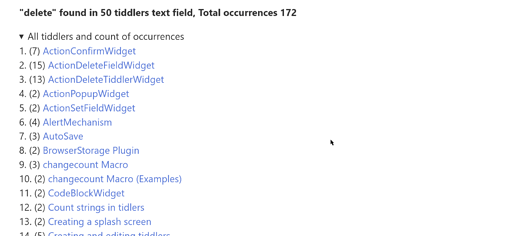Taking the search operator as a starting point
[all[tiddlers+system]search:text[my-word]] --> 53 tiddlers
Is there a way I can get a count of all mentions?
Pseudo-codally speaking,
[all[tiddlers+system]search-all:text[my-word]count[]] --> 42,123 mentions
OR
[all[tiddlers+system]search:text:everymention[my-word]count[]] --> 42,123 mentions
Is there an existing op that can do that?
TIA!


 But I’ll try it soon as I’ve upgraded (my dozens of wikis).
But I’ll try it soon as I’ve upgraded (my dozens of wikis).
